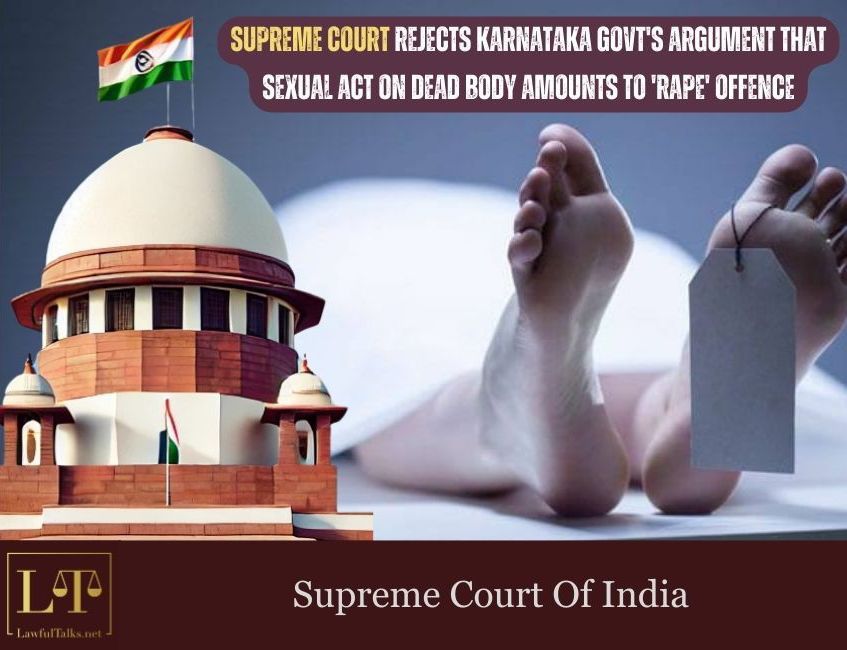Allahabad HC Sets Aside Afzal Ansari's Conviction, Allows Him to Continue as MP

In a notable ruling, the Supreme Court rejected the appeal filled by the State of Karnataka, observing that necrophilia could not be classified as a punishable offense since it does not fall within the scope of the penal provisions defining the offense of rape under Section 375 of the Indian Penal Code (IPC).

A bench of Justice Sudhanshu Dhulia and Justice Ahsanuddin Amanullah was hearing the plea challenging the order of Karnataka High Court. The accused had murdered a 21-year-old woman and had engaged in sexual intercourse with the dead body. The trial court had convicted the accused for the offenses of murder and rape under Section 302 and Section 375 of the Indian Penal Code. However, the Karnataka High Court acquitted the accused from charges of rape for sexual intercourse with the murdered body and upheld the conviction under the offense of murder. A Special Leave Petition (SLP) was filed by the Karnataka State Government before the Supreme Court.
Dismissing the petition, the bench held: “Since nothing has been shown to this Court that Necrophilia is an offence, we see no reason to take a different view than the High Court. The Special Leave Petition is, accordingly, dismissed.”
The Karnataka High Court, while overturning the decision of the Trial Court, held that the act of sexual assault on the dead body of a women does not attract the offense of rape punishable under Section 376. Thus, it acquitted the accused of rape charges for committing sexual assault on a dead body after murdering her. The bench observed that a careful reading of Section 375 and Section 377 of the IPC makes it clear that a dead body could not be called a human or a person. Thereby, the provisions of Section 375 or Section 377 of the Indian Penal Code would not attract. Therefore, there is no offense committed punishable under Section 376 of the Indian Penal Code.
The High Court referred to “The Medical Jurisprudence and Toxicology” by Dr. Modi while defining legal status of dead as "the personality of a human being may be said to commence existence on birth and cease to exist at death. The dead are no longer persons in the eyes of law. Their legal personality comes to an end at their death and they are destitute of rights and liabilities. They have no rights because they have no interests.”
Although the Karnataka High Court acquitted the accused of rape charges, it heavily emphasized the need for the Parliament to introduce laws that penalize necrophilia.
"It is brought to our notice that most of the government and private hospitals where the dead bodies, especially young woman kept in mortuary the attendant who appointed to guard, have sexual intercourse on the dead body. Thereby it is high time for the State Government to ensure such crime should not happen, thereby maintaining dignity of the dead body of the woman. Unfortunately in India no specific legislation enacted including under the provisions of Indian Penal Code for the purpose of upholding dignity and protecting rights and crime against the dead body of the woman.” urged the High Court
“It is high time for the Central Government in order to maintain right to dignity of the dead person/woman to amend the provisions of Section 377 of IPC should include dead body of any men, woman or animal or to introduce a separate provision as offence against dead woman as necrophilia or sadism as has been done in United Kingdom, Canada, New Zealand and South Africa, to ensure dignity of the dead person including woman” the High Court opined.
Thus, in accordance with the Karnataka High Court ruling, the Supreme Court rejected the plea where necrophilia constitutes an offense of rape.
Case Details: Case Title: State of Karnataka v. Rangaraju Vajapeyi (SLP (Crl) No. 5403 /2024
Karnaraka High Court Judgement
Advocate for Petitioner (s):Mr. Aman Panwar, A.A.G., Mr. V. N. Raghupathy, AOR & ors
Advocate for Respondents (s): Mr. Krishna Pal Singh, AOR, Ms. Anvita Aprajita, Adv. & ors




















































































































































































































































































































































































































































































































































































































































































































































































































